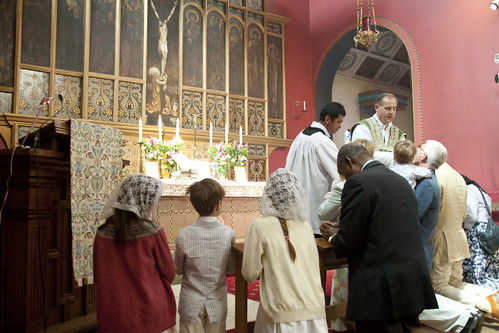 |
| Holy Communion at St Mary Magdalen, Wandsworth, with Fr Martin Edwards |
What is missing from his account is reference to the sacramental realities which are connected with the issue of the complementarity of the sexes, in Catholic theology. There is a danger, however, which can be seen in Catholic treatments of these issues, of fixating on the issue of sacramental validity, and regarding everything else as unimportant. Women can't be ordained priests: that's the end of the argument, it often seems, and we might as well give way on all the manifestations of the Church's teaching other than the ordination of women itself. This is part of a legal-positive drift which I have criticised before as a feature of neo-conservative thinking, amazingly illustrated the other day by Cardinal O'Malley saying that, if he had founded the Church, he would have 'loved' to have had women priests. No: it was not just an arbitrary and incomprehensible decision by Our Lord to ordain only men, which we can like or lump. Grace perfects Nature, it does not destroy or replace Nature. Leave the idea of a depraved Nature and an arbitrary Divine Will superimposed upon it to the Calvinists. This Evangelical reflection, below, ought to shame us for the superficiality of our usual discussions.
In passing I would like to note two important Catholic treatments of these issues. Manfred Hauke's classic work, 'Women in the Priesthood?' is an exhaustive investigation of the symbolic role of the feminine in the Old Testament, New Testament, and beyond. My criticisms of the work are, first, that he fails to see the full importance of the two concrete manifestations of complementarity which are contested in Catholic liturgical practice today, namely the service of the Altar and headcoverings. And second, his concern, like that of St John Paul II, is so focused on women that it tends to neglect men. You can't talk about complementarity without talking about both sides.
The other work is Leon Podles 'The Church Impotent: the Feminization of Christianity'. I have criticisms of this as well, and I intend to discuss some of his ideas in future posts. But you can read the whole book online, and it contains a lot of fascinating material, particularly about the nature of masculinity and how that fits in with spirituality.
--------------------------
A few thoughts, from a Protestant who is mostly agreed with the post above:
1. In Scripture, the primarily command to husbands isn’t to exercise authority over their wives and families, but to love them. This, I believe, is worthy of note.
2. Men, whatever they do or don’t do, naturally occupy the position from which father-like authority is symbolized. Women can have their own distinct form of ‘authority’, but father-like authority has a more pronounced character of its own. While a ‘matriarchy’ would rest principally upon the ‘authority’ that belongs to the immediacy of the mother-child bond, ‘patriarchy’ rests primarily upon the authority that belongs to the father-figure, who stands over against his family in a way that the mother cannot (since the family union is formed in and through her body). The relationship between the father figure and his family is not the immediate bodily one of the mother, but a relationship established by law and covenant commitment. The father stands over against others and thus can symbolize authority that lays claim upon us from beyond and without our immediate intimate bonds.
3. Following on from the previous point, I don’t believe that the scriptural emphasis when it comes to the authority of husbands is upon their actions, but upon their persons. Men can symbolize authority for much the same sorts of reasons as women can symbolize the most intimate bonds of the family. The man is an authority figure, but not because he throws his weight or will around. He just is. As an authority figure he is called to stand for that reality in a loving and faithful manner, symbolizing and embodying the founding spiritual norms of the household in a way that builds up and strengthens all within it. When men forget that they naturally symbolize authority, they can fall into the trap of thinking that they must become authority figures through domineering leadership, which isn’t healthy for anyone.
4. Where men drop out or embrace passivity, women don’t start to exercise authority instead. Rather, a culture’s sense of any authority over against it starts to dissipate. I have discussed this dynamic in terms of the priesthood here.
5. Finally, authority, exercised properly, is ‘authorizing’ and ‘empowering’. The husband and father’s authority exists for the good of his wife and family and he should exercise it in a way that empowers and strengthens them as God’s servant. This is one reason why I am a little wary of focusing upon the husband’s authority as one over his wife and family. There are senses in which this is the case. However, the husband’s authority is primarily one for his wife and family, one that exists to give them a surer footing and wider influence in the world. This isn’t a zero sum game. The weight of the husband’s authority shouldn’t really be one placed upon his wife and children, but one put behind them.
Support the work of the LMS by becoming an 'Anniversary Supporter'.
Thank you for this post. I have never read Leon Podles until today but I have remedied that and would suggest some might want to read his article,
ReplyDeleteAll That Separates Must Converge." It has some astounding things to say